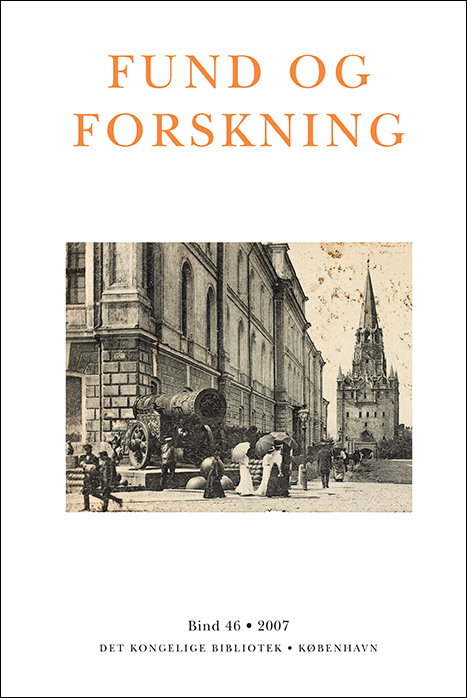“Sagen har den største Betydning for vort Land”. H.O. Langes kamp for et dansk arkæologisk institut i Ægypten
DOI:
https://doi.org/10.7146/fof.v46i0.41200Resumé
In early 1938, the Danish Egyptologist H.O. Lange received a letter from his colleague and friend of many years, the German-Jewish Egyptologist Ludwig Borchardt. Ludwig Borchardt was the former Director of the German Archaeological Institute in Egypt, but following his retirement had set up his own institute in Cairo, financed by a Swiss foundation established for the purpose. In his letter Borchardt wrote about the latest clampdowns on Jewish citizens in Nazi Germany, which meant that all Jewish German citizens in Germany and abroad had to have their property registered. Ludwig Borchardt feared that his property would be confiscated and did not intend to comply with the decree. He was worried that his decision, when it became known, would result in him and his wife losing their German citizenship. In order to protect the institute in Cairo, as well as himself and his wife, Mimi, Ludwig Borchardt offered to transfer the institute to an academic institution in Denmark in return for Danish citizenship for himself and his wife. H.O. Lange understood the importance of his friend’s letter and put the matter personally to Foreign Minister P. Munch. H.O. Lange wanted to help his old friend – he had known Ludwig Borchardt for more than half a century – out of his difficult situation, but he also saw an opportunity to acquire for Denmark a valuable institute in Egypt that would put the University of Copenhagen at the centre of Egyptology in Scandinavia. During the summer and autumn of 1938, ministers and officials at the Ministry of Foreign Affairs, Ministry of the Interior and Ministry of Education discussed the possibility of acceding to the German-Jewish couple’s wishes and securing the academically important institute for Denmark. In the end it all came to nothing because of the Ministry of the Interior’s unwillingness to dispense with current regulations and grant Mimi Borchardt Danish citizenship in the next Nationality Act in March 1939 (in the meantime Ludwig Borchardt had died on 12 August 1938). But there was also reluctance of the part of the Ministry of Foreign Affairs and the Ministry of Education. Acquisition of the institute by Denmark might be perceived in Germany as a deliberate evasion of German law. The University of Copenhagen, which the institute would have come under, recognised the institute’s academic value, but feared that the matter might damage the relationship between Danish and German academia. No one wanted a confrontation with Denmark’s Nazi neighbour in the autumn of 1938. Denmark was not the only country to be approached by Ludwig and Mimi Borchardt. The couple had also put out feelers in the USA (Harvard) and Britain (Oxford), but these countries were not willing to relax their citizenship rules in return for being made a gift of the institute in Cairo either. Nazi Germany never did lay claim to the institute in Cairo, which Mimi Borchardt secretly made over to the Swiss foundation a few weeks after Ludwig Borchardt’s death for safety’s sake. After the end of World War II the institute reopened its doors in 1949/50 as the Swiss Archaeological Institute in Egypt. Neither H.O. Lange nor Mimi Borchardt lived to see the opening, however. H.O. Lange died in 1943, Mimi Borchardt in 1948.Downloads
Publiceret
2014-05-15
Citation/Eksport
Pedersen, L. S. (2014). “Sagen har den største Betydning for vort Land”. H.O. Langes kamp for et dansk arkæologisk institut i Ægypten. Fund Og Forskning I Det Kongelige Biblioteks Samlinger, 46, 197. https://doi.org/10.7146/fof.v46i0.41200
Nummer
Sektion
Artikler


